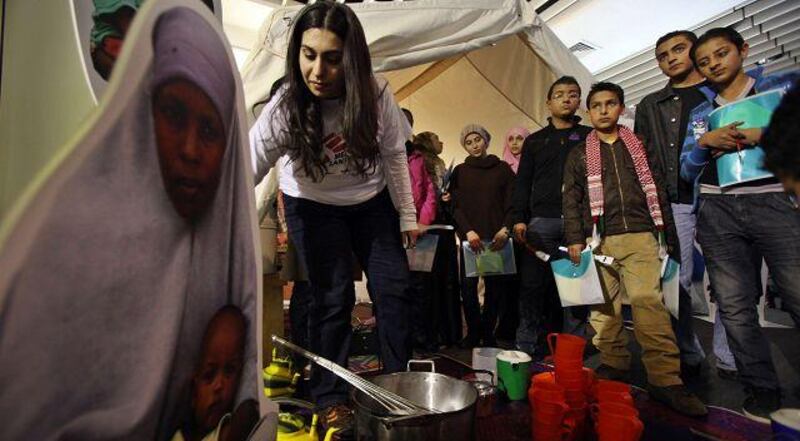AMMAN // A group of volunteers from the international humanitarian organisation Médecins Sans Frontières has begun touring the region to explain their work. Since 1971, MSF has provided medical help and psychological support for victims of natural and man-made disasters and armed conflicts. It also cares for the sick, runs vaccination campaigns and provides feeding programmes for the malnourished.
The network of 27,000 volunteers that operates in 60 countries is now giving the public in the Middle East a first-hand look at the scope of its work, the challenges it faces and how it never takes sides even when caught in the crossfire. "In a conflict setting, there is a lot of confusion, and we think that the public is confused with having all other NGOs working with different agendas," Christophe Fournier, the president of the MSF International Council, said.
"It is very important to distinguish how an organisation like MSF is independent, neutral and impartial. Our mission is limited to medical help to alleviate the suffering of victims." For that reason, 25 MSF volunteers from Jordan, the Palestinian territories, Lebanon, Iraq, France and Switzerland this month began touring the region with Jordan as first stop in its attempt to shed light on the organisation's work.
An MSF exhibition, which included several makeshift inflatable hospital tent set-ups, was opened at the Al Hussein Cultural Centre last Wednesday and will be held in different places in the capital for more than a month. The tents included surgery theatres used in disaster areas, where MSF has a record of intervening within 48 hours. One tent was dedicated to treating acutely malnourished children.
Sachets of a fortified peanut paste that MSF caregivers began distributing in the past five years to severely malnourished children were on display. The paste has a mix of minerals, vitamins and powdered milk that provides rapid and strong nourishment and which has helped MSF save many lives. In one corner, crayons and papers with sketches provided an example of how clinical psychologists are helping Iraqi children in Jordan to take their minds off their injuries. Since 2006, MSF has provided reconstructive surgery for more than 1,100 Iraqis who suffered from severe burns, facial injuries and fractures, bone, skin and soft tissue defects and bone loss.
One photo showed Adel, a seven-year-old playing with balloons during a group therapy session in 2007. His face was crushed by a car bomb explosion in 2006 in Baghdad. "On average, they stay in Jordan for five months. We engage them in games. When we have them in groups, they do not feel that they are alone," Mohammad Jamal, a clinical psychologist, said. A poster gave a glimpse of a project in Tambura in South Sudan launched in 2004 to treat sleeping sickness. Another one showed MSF teams talking to children and people in Gaza before making initial check-ups in January last year, when Israel attacked the coastal enclave. "We are trying to show the scope of our medical intervention," Mr Fournier said.
The idea behind the exhibition did not come out of thin air. While MSF medical intervention occurs in armed conflicts, there has been misconceptions about its role. "Everywhere there is a conflict and there are western countries engaged, this makes our work difficult as we are wrongly associated with [those countries]. We work in Afghanistan but we are not in favour of the Nato or the US or the Taliban taking over the country - We do not take sides and we do not have an opinion," Mr Fournier said.
"In the 70s we worked under the bombings in Lebanon during the war [and in] places like Afghanistan and Somalia, where MSF staff were targeted and killed. We accept to take risks but what we do not accept is to be deliberately targeted." Last year, MSF returned to Afghanistan after it suspended its operation there for five years when five of its staff were killed in 2004. "Their assassination was preplanned," Mr Fourner said. "We are human beings, and it's emotional to see our colleagues killed in a cold blood."
In 2008, three MSF staff in Somalia were killed by a roadside bomb. The international staff withdrew then, but its local staff continued operating the programme, which started in 1991. "Now we are back little by little," Mr Fournier said. "If you want to have access to both sides of the front line, all parties have to understand you are impartial." smaayeh@thenational.ae





